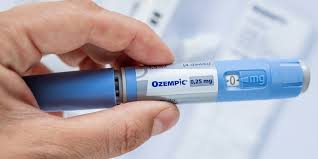Does Ozempic Injection Affect Your Mood or Mental Health?
Ozempic injection have become a powerful tool for weight management and type 2 diabetes control. But beyond the physical effects like appetite suppression and fat loss, many users are asking:
“Can Ozempic impact my mood or mental health?”
This is an important question, especially for those with existing emotional concerns or those wondering how metabolic changes may influence mental well-being. In this post, we’ll explore the psychological effects — both positive and negative — associated with Ozempic injections, based on clinical research and real user experiences.
Understanding the Brain–Gut–Hormone Connection
Before diving into mood-specific effects, it’s crucial to understand how Ozempic (semaglutide) works:
It mimics the GLP-1 hormone, which affects insulin, appetite, and digestion.
GLP-1 receptors also exist in the brain, influencing mood, hunger, and behavior.
Metabolic shifts — including blood sugar regulation and weight loss — can impact how you feel mentally and emotionally.
So yes, Ozempic does influence areas beyond the body — and your mental state is part of that system.
Positive Mental Health Effects Reported by Users
Many people who use Ozempic experience mental and emotional improvements, including:
✅ Improved Mood from Blood Sugar Stability
Fluctuating blood sugar can cause:
Irritability
Mood swings
Brain fog
Anxiety
By keeping your glucose levels stable, Ozempic helps reduce these mood-altering highs and lows.
✅ Enhanced Self-Esteem from Weight Loss
Losing weight can improve:
Body image
Self-confidence
Social interactions
Overall life satisfaction
People often feel empowered and more positive as they gain control over their health journey.
✅ Reduced Food Anxiety and Cravings
Food obsession and binge eating can cause emotional distress. With Ozempic:
Appetite reduces naturally
Cravings become manageable
Food no longer controls your thoughts
This freedom from food-related stress leads to emotional relief.
Possible Negative Effects on Mental Health
While many people report improvements, a small number have mentioned mood-related side effects. These can include:
⚠️ Temporary Fatigue or Lethargy
Low energy during the early weeks might make you feel:
Unmotivated
Low-spirited
Withdrawn socially
This often improves once your body adapts.
⚠️ Nausea and Emotional Drain
Chronic nausea or discomfort can wear on mental health over time. It’s not the mood directly, but:
Lack of appetite
Difficulty enjoying food
GI upset
…can all reduce emotional quality of life.
⚠️ Anxiety or Mood Changes (Rare Cases)
Some anecdotal reports mention:
Mild anxiety
Emotional blunting
Feeling “detached” or less emotionally responsive
However, these symptoms are rare and not widely supported by clinical trials.
🔍 Important: Always report mood changes to your healthcare provider, especially if you have a history of depression or anxiety.
What the Research Says
Though Ozempic is not a psychiatric medication, early studies and GLP-1 receptor research suggest:
Improved cognitive performance
Enhanced brain insulin sensitivity
Better mental clarity
Reduced inflammation in the brain (linked to depression)
These findings are still emerging, but they hint at potential long-term mental health benefits of Ozempic.
Tips to Support Your Mood While on Ozempic
To balance your emotional well-being during Ozempic treatment:
| Action | Why It Helps |
|---|---|
| Eat nutrient-rich meals | Supports brain health and energy |
| Stay active daily | Exercise boosts mood-regulating chemicals |
| Practice mindfulness | Reduces anxiety and stress |
| Get quality sleep | Essential for emotional resilience |
| Talk to someone | Therapy or check-ins can provide clarity |
Real User Feedback: Emotional Journey on Ozempic
“I started feeling mentally clearer and more motivated after week 3.”
“The reduced food noise gave me so much mental peace — I didn’t realize how anxious I was around eating until Ozempic helped me stop obsessing.”
“I had some nausea early on that made me feel down, but once that passed, my mood actually lifted because I had more control.”
When to Seek Help
If you notice any of the following symptoms persisting, consult a healthcare professional:
Depression or sadness
Loss of interest in usual activities
Sleep disruption due to anxiety
Feelings of hopelessness
Irritability or aggression
Mood changes may be related to something other than Ozempic, but should always be taken seriously.
Conclusion: Ozempic’s Role in Mind and Mood
Ozempic injections have a direct impact on hormonal and metabolic health — and those changes inevitably influence your emotional state. While most users report enhanced clarity, mood, and emotional freedom, others may experience temporary fatigue, GI side effects, or in rare cases, mood fluctuations.
By listening to your body, staying mindful of how you feel, and supporting yourself with nutrition, rest, and activity, you can enhance both your mental and physical health during Ozempic treatment.
